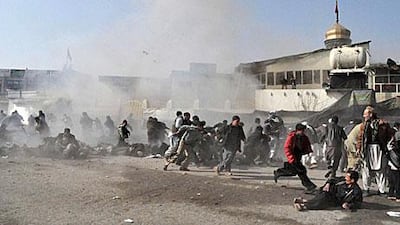KABUL // A suicide bomber killed at least 55 people in an attack on Shiite worshippers at a mosque in Kabul yesterday in the he deadliest of two attacks on a Shiite holy day – the first major sectarian assaults since the fall of the Taliban a decade ago.
Four other Shiites were killed in the northern city of Mazar-i-Sharif when a bomb strapped to a bicycle exploded as a convoy of Afghan Shiites was driving down the road, shouting slogans for the festival known as Ashura, a government official said.
The Kabul bomber blew himself up in the midst of a crowd of men, women and children gathered outside the Abul Fazl shrine near the presidential palace to commemorate the seventh century death of the Prophet Mohammed’s grandson, Imam Hussein.
The shrine was packed with worshippers and dozens more were crammed into the courtyard.
One witness said the bomber was at the end of a line and detonated his explosives near one of the gates to the shrine.
The interior ministry said 55 were killed – including two women and four children. Sayed Kabir Amiri, who is in charge of Kabul hospitals said more than 160 were wounded in the blast.
He said casualties were taken to several hospitals and the toll could rise.
Religiously motivated attacks on Shiites are rare in Afghanistan although they are common in neighbouring Pakistan.
No group claimed responsibility for yesterday’s blasts, reminiscent of the wave of sectarian attacks that shook Iraq during the height of the war there.
The interior ministry in a statement blamed the Taliban and “terrorists” for the attack. It gave no details but added police defused another bomb in Mazar-i-Sharif near the one that blew up.
The Taliban strongly condemned the two attacks and said in a statement they deeply regretted that innocent Afghans were killed and wounded. Sectarian attacks are almost unheard of in Afghanistan, although the Taliban massacred Shiites in Bamiyan and Mazar-i-Sharif during the civil war.
Afghan President Hamid Karzai, speaking at a news conference after meeting German Chancellor Angela Merkel in Berlin, said the attack was unprecedented.
Main attacks in Kabul this year
January 28: Eight people killed in a suicide bombing at a central supermarket popular with westerners.?
May 21: Six medical students are killed in a Taliban suicide attack at Afghanistan's main military hospital.
June 18: Nine people killed when suicide attackers storm a police station.?
June 28: Twenty-one killed, including 10 civilians, when suicide bombers storm the InterContinental Hotel.?
August 19: Nine people, including a New Zealand special forces soldier, die when suicide bombers attack the British Council cultural centre.
September 13-14: Taliban attacks target locations including the US Embassy and headquarters of foreign troops, killing at least 14 during a 19-hour siege.?
September 20: Burhanuddin Rabbani, Afghanistan's former president leading efforts to find a peace deal with the Taliban, is assassinated in a suicide attack at his home in the supposedly secure diplomatic zone.?
October 29: Thirteen US troops operating under Nato are among 17 people killed in a car bomb attack on a foreign military convoy.
He said it was “the first time that on such an important religious day in Afghanistan terrorism of that horrible nature is taking place”.
Mohammad Bakir Shaikzada, the top Shiite cleric in Kabul, said he could not remember a similar attack.
“This is a crime against Muslims during the holy day of Ashura. We Muslims will never forget these attacks. It is the enemy of the Muslims who are carrying them out,” he said, declining to place blame.
Shiites make up about 20 percent of Afghanistan’s 30 million people, most of them ethnic Hazaras, a group at the bottom of the social scale.
Although thousands of Hazaras were massacred by the Taliban during fighting in the 1990s, Afghan insurgents – nearly all of them Sunnis – in recent years have focused their attacks primarily on US-led Nato troops and Afghan security forces.
The last major incident of violence between Shiites and Sunnis after the US invasion 10 years ago occurred in early 2006, during Ashura commemorations in the western city of Herat.
During those riots, blamed on Islamic extremists, five people were killed and more than 50 injured.
Mahood Khan, who is in charge of the Abul Fazl shrine, said the explosion occurred just outside a courtyard where dozens of worshippers were lined up as they filed in and out of the packed building.
A few minutes after the blast, bodies could be seen loaded into the trunks of cars while wounded were led away by friends and relatives. Survivors wept in the streets.
“It was a very powerful blast,” Mr Khan said. “It was out of control. Everyone was crying, shouting. It is a disaster.”
Mustafa, a shopkeeper, said he and his mother were delivering food to the worshippers when the blast occurred “It was very loud. My ears went deaf and I was blown three metres,” said Mustafa, who uses only one name. “There was smoke and red blood on the floor of the shrine. There were people lying everywhere.”
The shrine’s loudspeaker continued to blast a recitation of the Quran as ambulances carried bodies and wounded away. Women stood outside the shrine wailing and holding crying children.

